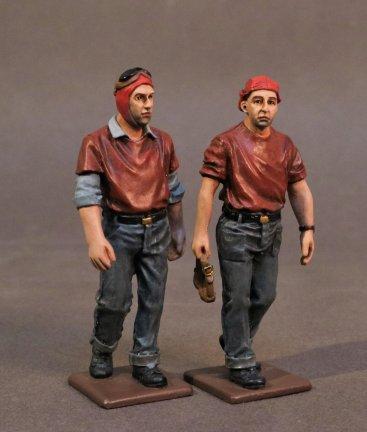Two Ordnancemen Walking, USS Saratoga (CV-3), Inter-War Aviation--two figures--RETIRED--LAST TWO!!
$78.00
John Jenkins Designs - RETIRED COLLECTION
Item Number: IWA-18R
Two Ordnancemen Walking, USS Saratoga (CV-3), Inter-War Aviation
The Interwar Aviation series covers aircraft that were developed and used between World War I and World War II, and was known as the “Golden Age of Aviation.” In the two decades between the end of World War I and the start of World War II, military aviation underwent a complete transformation. The typical combat aircraft of 1918 was a fabric-covered externally braced biplane with fixed landing gear and open cockpits. Few aero engines developed as much as 250 horsepower, and top speeds of 200 km (120 miles) per hour were exceptional. By 1939, the first-line combat aircraft of the major powers were all-metal monoplanes with retractable landing gear.
Most early aircraft carriers were conversions of ships that were laid down (or had even served) as different ship types: cargo ships, cruisers, battlecruisers, or battleships. During the 1920’s, several navies started ordering and building aircraft carriers that were specifically designed as such. This allowed the design to be specialized to their future role, and resulted in superior ships. During the Second World War, these ships would become the backbone of the carrier forces of the U.S., British, and Japanese navies, known as fleet carriers.
USS Saratoga (CV-3) was a Lexington-class aircraft carrier built for the United States Navy during the 1920’s. Originally designed as a battlecruiser, she was converted into one of the Navy's first aircraft carriers during construction to comply with the Washington Naval Treaty of 1922. The ship entered service in 1928 and was assigned to the Pacific Fleet for her entire career. Saratoga and her sister ship, Lexington, were used to develop and refine carrier tactics in a series of annual exercises before World War II. On more than one occasion, these included successful surprise attacks on Pearl Harbor, Hawaii. She was one of three prewar US fleet aircraft carriers, along with Enterprise and Ranger, to serve throughout World War II.
Ordnance, fire fighters and crash crews wore red on the flight deck to indicate their job. Ordnancemen on flight deck crews often wore red helmets with a black stripe to differentiate them from firefighters and crash crewmen, who also wore red shirts and helmets.
RETIRED.
LAST TWO!!
